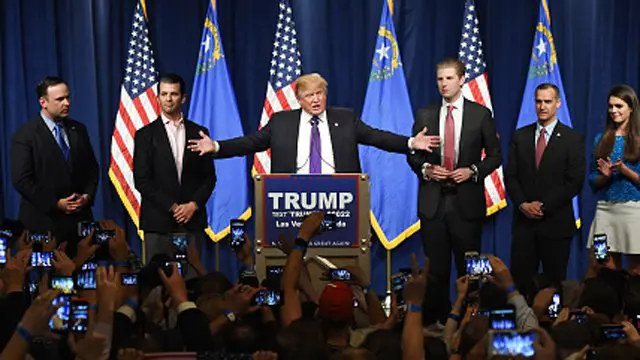With Donald Trump's growing prospects of winning the Republican nomination for the White House, the party's establishment is gearing up a concerted, and sometimes desperate, effort to stop him before it is too late.
On Saturday, the billionaire candidate won two more states in primary contest, continuing a comfortable lead over Senator Ted Cruz, who also scored victories in two states.
Mitt Romney, the Republican Party's nominee for President in the 2012 election, delivered a strongly worded attack on Trump on Thursday, calling him a "fraud" and a "phony."
"His domestic policies would lead to recession. His foreign policies would make America and the world less safe," Romney said. "He has neither the temperament nor the judgment to be president. "
Trump quickly hit back, saying he was disappointed by Romney's 2012 campaign. He also suggested that Romney may continue to have 2016 ambitions of his own, but had "chickened out" earlier.
In another effort to discredit Trump, more than 50 Republican experts on foreign policy and national security have signed an open letter condemning the real estate magnate as "unfit" for the office.
"We are united in our opposition to a Donald Trump presidency," said the letter, whose signatories include former homeland security secretary Michael Chertoff, former deputy secretary of state Robert Zoellick, former homeland security adviser Frances Townsend and former undersecretary of defense Dov Zakheim.
The letter denounced Trump for his anti-Muslim rhetoric, advocacy for waging trade wars, and his embrace of the expansive use of torture. It also targeted his comments about building a wall along the border with Mexico and about illegal immigrants causing crime.
"His equation of business acumen with foreign policy experience is false," said the letter. "Not all lethal conflicts can be resolved as a real estate deal might, and there is no recourse to bankruptcy court in international affairs."
Senator John McCain, who had the Republican Party's nomination in 2008, also echoed concerns about Trump's "uninformed and indeed dangerous" statements.
"I want Republican voters to pay close attention to what our party's most-respected and knowledgeable leaders and national security experts are saying about Mr. Trump, and to think long and hard about who they want to be our next commander in chief and leader of the free world," he said.
Beyond harsh criticism, there seems little the Republican establishment could do to stop Trump's march toward the presidential nomination. Party leaders are looking at a possible contested national convention and even flirting with the idea of third-party candidacies.
Key Republican figures' recent denunciation on Trump also underscores the deepening division in the party that pundits say has not happened in decades.
"Something is happening in the Republican Party that has not happened in living memory," wrote Ron Elving, a senior editor and analyst for National Public Radio. "The party of unity, tradition, order and hierarchy is breaking apart over one man who personifies the concept of disruption." Enditem
 简体中文
简体中文

